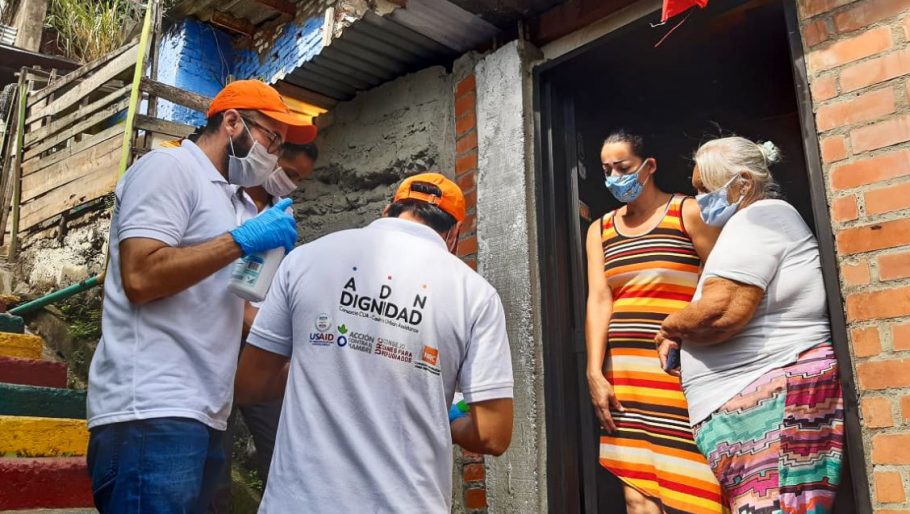COVID-19, sanctions, counterterrorist financing and CVA

Are anti-money laundering, counter-terrorist financing or know your customer requirements hampering your ability to reach vulnerable communities during the COVID-19 pandemic? This is what we know so far. Do you have examples which can be used to influence policy?
The COVID-19 pandemic has brought with it a renewed focus on the impact of sanctions on humanitarian operations. Recent weeks have seen the release of several statements, including from the UN Special Rapporteur on the Right to Food, the High Commissioner for Human Rights, the UN Secretary-General and the Norwegian Refugee Council, on the need for sanctions to be amended to ensure they do not impede efforts to stem the spread of the virus.
In response, some states and multilateral bodies, responsible for the imposition of sanctions have publicly emphasised that sanction exemptions are available. For example, the Financial Action Task Force (FATF) has just released a brief on COVID-19-related Money Laundering and Terrorist Financing – Risks and Policy Responses, providing a range of potential responses to the newly emerged risks in order to, inter alia, “facilitate charitable activity”. These include simplified due diligence measures where lower risks are identified, and offering access to digital/contactless payment solutions, as well as encouraging the use of responsible digital identity and other responsible innovative solutions for identifying customers at onboarding and while conducting transactions.
Some of these practices have already been applied in Colombia, where Financial Service Providers and local authorities have been demonstrating flexibility on Know Your Customer (KYC) requirements for Venezuelans by recognizing expired and alternative documents, a practice that commenced before the onset of the COVID-19 pandemic, but has continued.
Meanwhile, use of CVA is being scaled up to meet growing needs owing to the pandemic, with humanitarian actors at national and global levels working to expand cash programmes to reach newly-affected people and, in some cases, switching existing in-kind programmes to cash. In many cases this assistance will be channelled through the government-led social protection systems, but in contexts the systems are not comprehensive, weak, don’t exist or cannot be adjusted rapidly, humanitarian actors will need to fill gaps. Humanitarian cash delivery systems exist in almost every crisis context, and these could be rapidly leveraged to deliver assistance to those out of reach of government systems.
Of the beneficiary states listed in the UN’s Global Humanitarian Response Plan for COVID-19, around 75% are subject to international sanctions. A significant scale up of CVA in these environments will be difficult given already existing challenges that originate with sanctions and related anti-money laundering (AML) and counter-terrorist financing (CTF) requirements. Anecdotally, we hear of examples of programmes unable to pivot to CVA assistance due to the potential of a chilling effect in relation to sanctions. This, together with other operational challenges will, we fear, have a compound effect on the ability to reach the most vulnerable in societies quickly and effectively
While the impact of sanctions on humanitarian operations more broadly has been widely documented, the specific consequences for CVA have yet to be comprehensively explored. In 2019 the CALP Network commissioned a scoping study on CVA and risk, which considered the challenges and impact of Know Your Customer regulations, AML/CTF and international sanctions. The study concluded that although to date, CVA was not explicitly targeted by the regulations reviewed, there has been a trickle-down impact on the modality. While there is no evidence that CVA is riskier than in-kind assistance, the study reflects that there can be greater sensitivity among donors and financial institutions when it comes to cash because of a perception that it poses a greater risk. This is reflected in the fact that while donor regulations generally require organisations to ensure that aid does not benefit sanctioned persons or groups, requests for information regarding CVA are often more extensive than those for other kinds of aid, as highlighted in this practical guide to principled humanitarian action from counter-terrorism risks from NRC. Further reflecting this perception of risk, legal and reputational concerns of financial institutions and private companies have led to ‘de-risking’ whereby they refuse to facilitate transactions of humanitarian actors operating in contexts where sanctions apply.
The need for revised donor requirements and a review of KYC requirements to facilitate rapid remote cash transfers to those in need during the response to COVID-19 has already been highlighted. The calls for simplified customer due diligence and the revision of sanctions these measures are often based on, can be bolstered by concrete examples of impact from practitioners, so policy makers can be encouraged to make evidence-based decisions.
In gathering evidence of impact, challenges are likely to emerge in the following areas:
- Transferring funds to the country of operations – challenges in identifying willing banking providers and other Financial Service Providers (FSPs) to transfer funds to a country of operation
- Identifying in-country service providers – challenges related to KYC regulations and financial sector identity checks by in-country FSPs, including mobile network operators
- Beneficiary identification and data security – challenges relating to sanctions and to AML/CTF regulations including KYC requirements, along with those imposed by donors
Practice highlights, that policy is best influenced whilst still in development. At this moment of unprecedented change, the emergence of the “new normal”, and the significant surge in CVA scale, we have a unique opportunity to engage with and persuade policy makers – based on evidence.
Has your CVA programme been negatively affected by AML/CT sanctions? Or do you have examples of measures being relaxed in response to COVID-19 to enable work to continue?
Please get in touch through comments to this blog or by sharing your experiences here.
Main image credit: NRC


